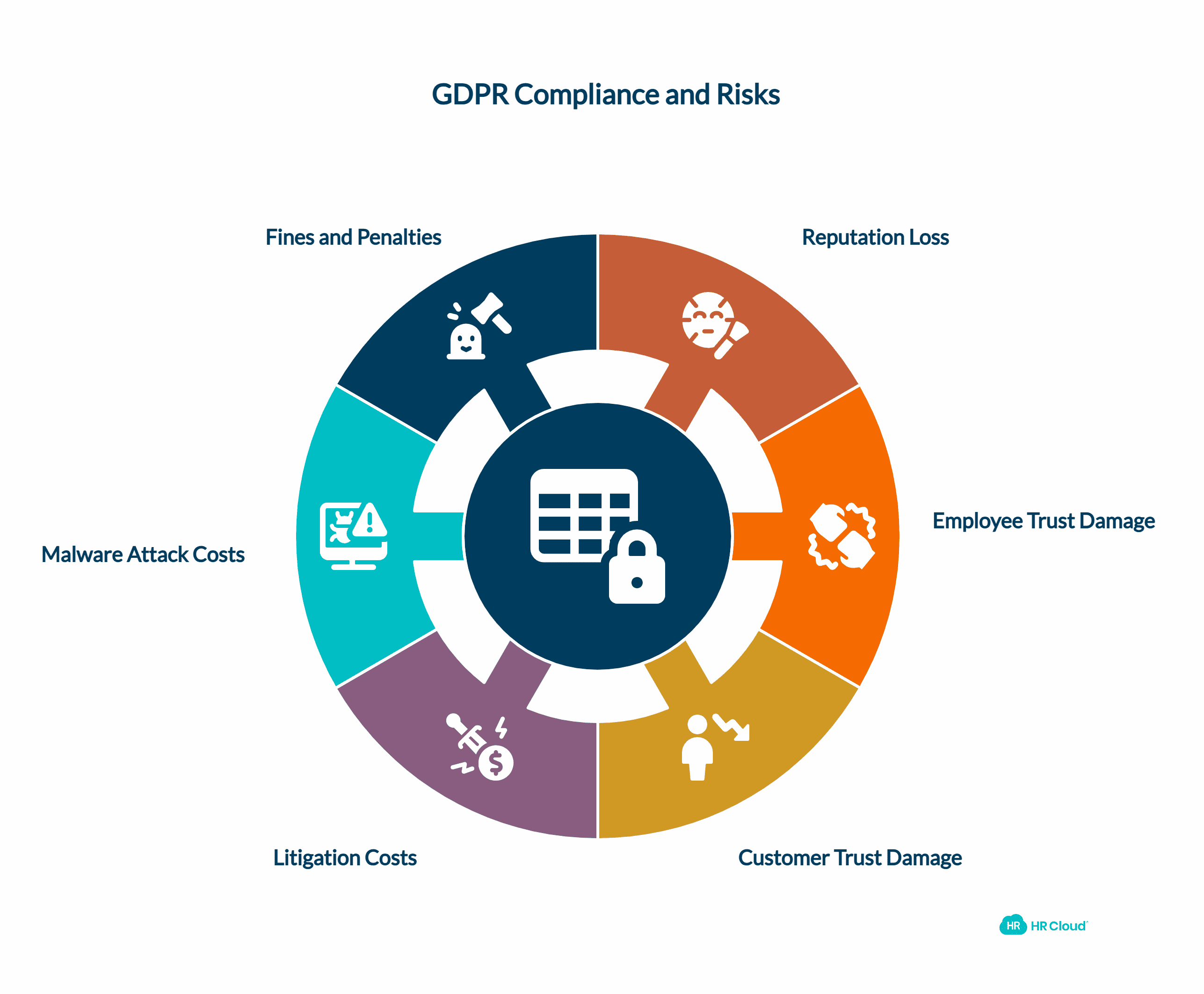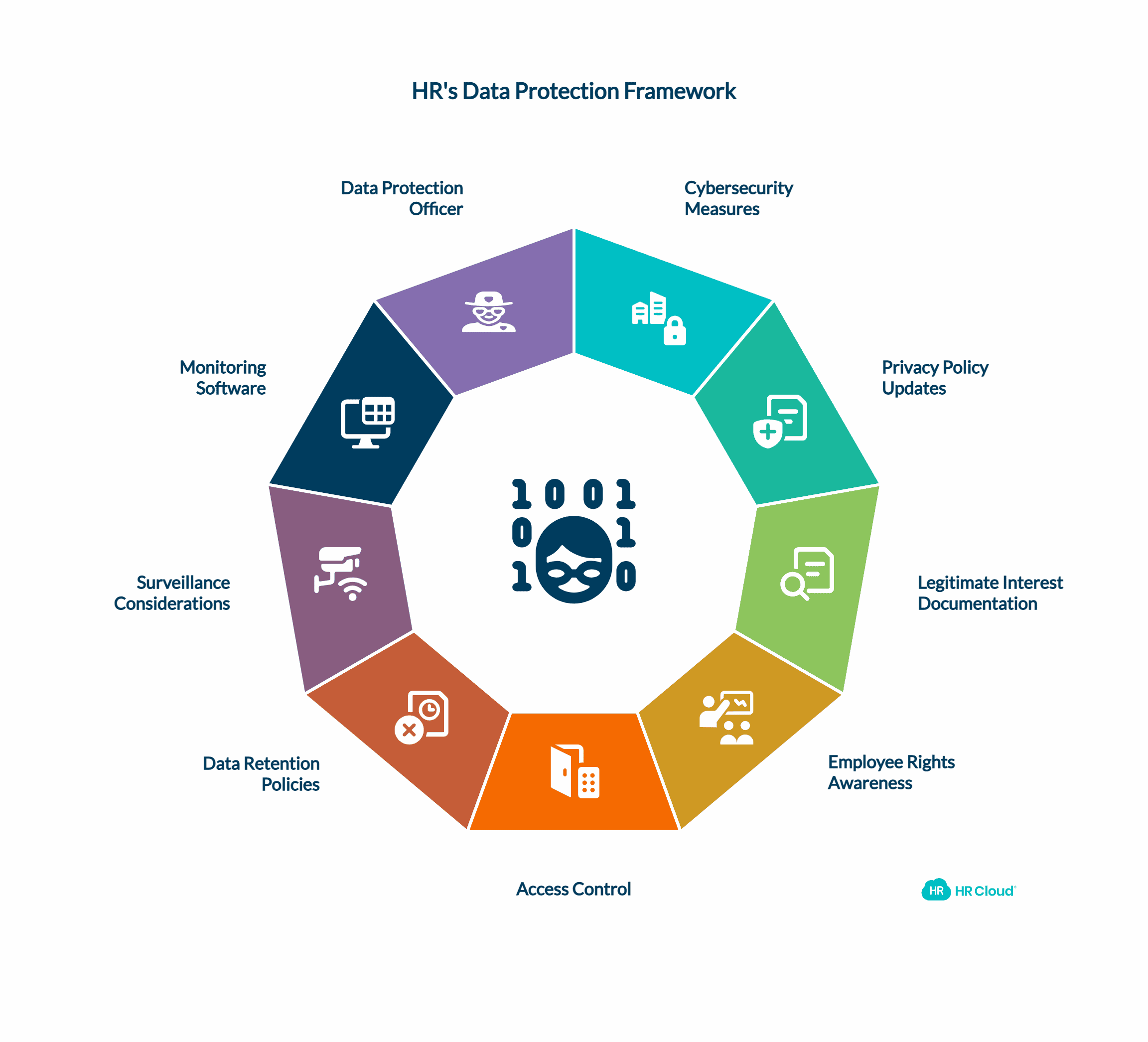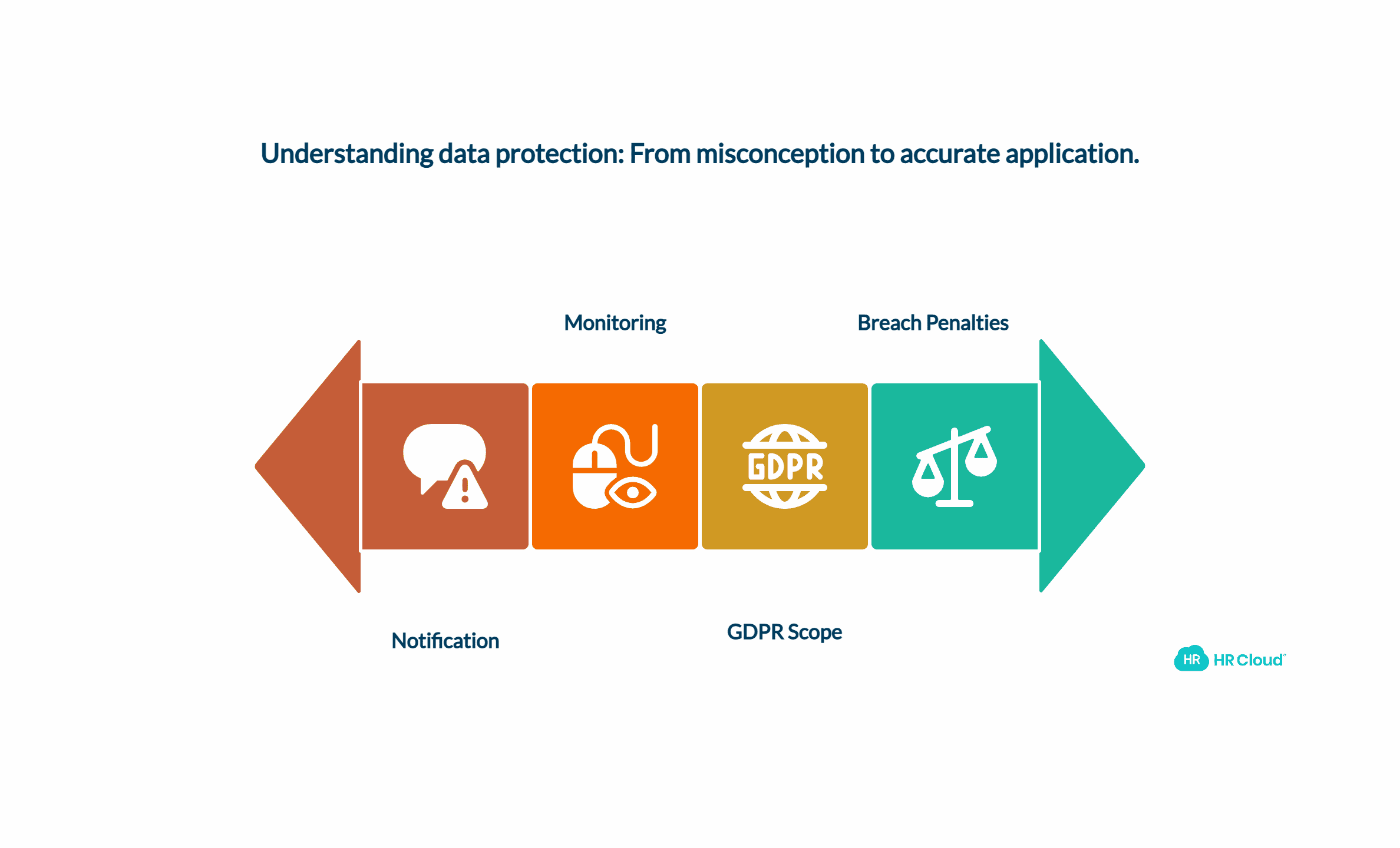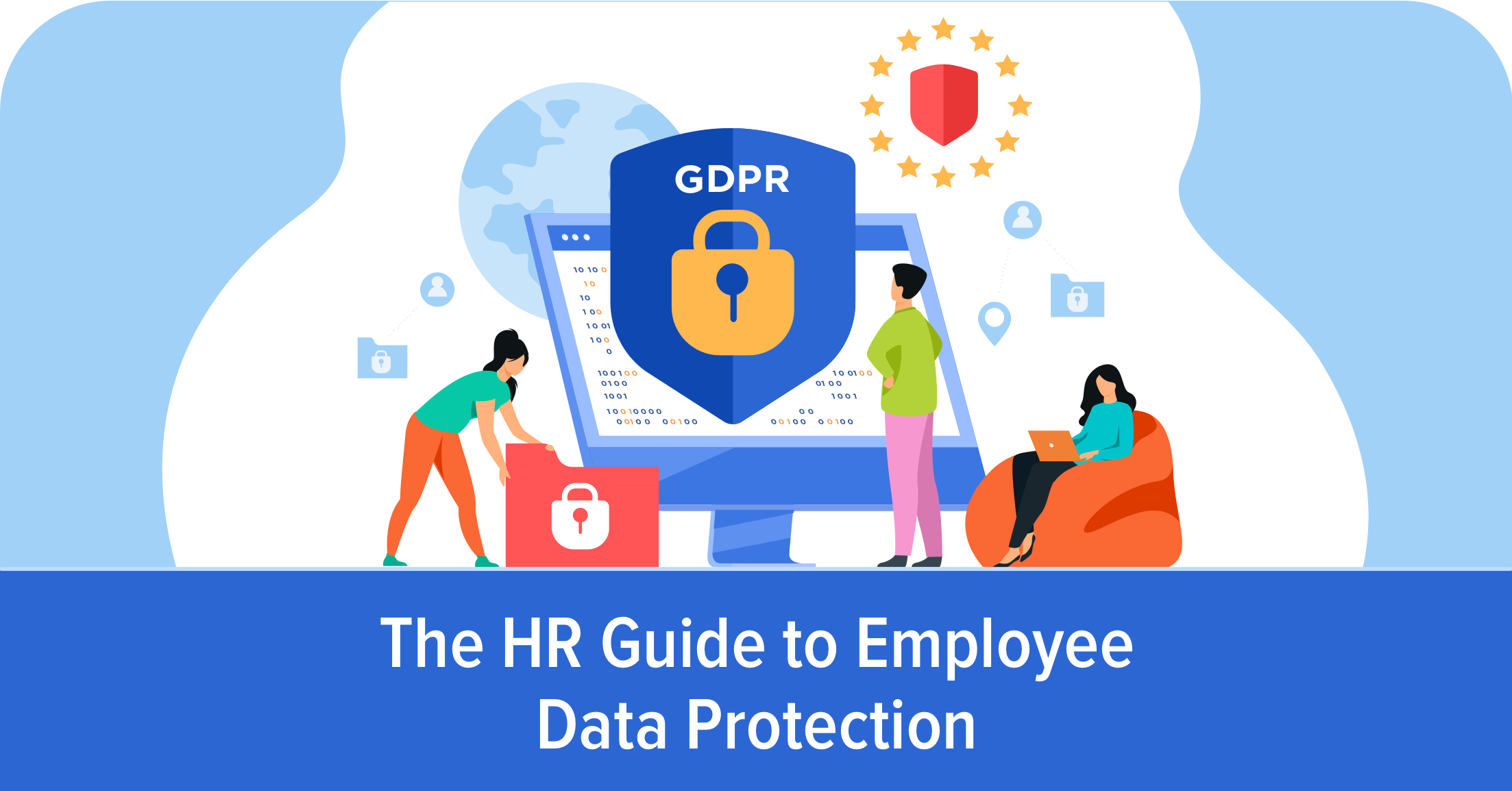

 Cut onboarding time
by 60%—here's the
Ultimate Checklist
that helped do it.
Cut onboarding time
by 60%—here's the
Ultimate Checklist
that helped do it.

It's no secret that HR professionals have a wide range of important responsibilities. They're tasked with managing disciplinary and grievance procedures, handling payroll, as well as actively managing and overseeing the company's recruitment and resourcing strategies.
However, one of their most important tasks is to protect both the company and hr data from a multitude of potential threats, from company negligence to cybersecurity breaches. If they fail to do so, an identity theft lawyer could have a big clean-up job on their hands.
This article brings you the HR guide to employee data protection and what an HR professional needs to do to comply with data protection laws and compliance regulations. Let's get into it.
GDPR: An Overview of HR
The General Data Protection Regulation (GDPR) is a relatively new EU data privacy regulation that came into effect on May 25, 2018. The reason for its inception is due to the fact that companies are now gathering data at an exponential rate, from both consumer and employee aspects.
The more data a company holds, the more likely it is to become the target of hackers and cyber thieves trying to obtain information for nefarious activities such as computer crimes and fraud.
When you think about it, HR departments have access to a lot of sensitive employee information, such as their name, social security number, address, date of birth, previous addresses, and so on. It's a virtual gold mine for hackers and cybercriminals. This sensitive information falls under the category of vulnerable data subjects, requiring extra protection.
However, the risk doesn't just fall on the shoulders of the employee. Here are some of the ways businesses can suffer from data leaks:
-
A significant loss of reputation
-
Damage to employee trust
-
Damage to customer trust
-
Litigation costs
-
Costs from malware attacks
-
Fines and penalties
GDPR aims to protect employees' personal data by setting out guidelines and regulations that companies must adhere to if they are to remain compliant. Otherwise, they could be liable to face punishment in the form of fines and penalties. This regulation also introduces the concept of data subject rights, empowering employees with more control over their personal information.
What HR Needs to Do to Comply with Employee Data Protection
There are a lot of information and regulations that HR professionals must keep up with in order to keep up with the new GDPR and employee data protection rules. Here are some of the main tasks HR needs to address:
-
Recognize and prevent cybersecurity attacks. This means choosing the right cloud services that have data protection as a priority.
-
Update and review privacy policies for all staff
-
Always document the reason for the need to process personal information, ensuring there is a legitimate interest in doing so.
-
Making sure employees understand their data protection rights, particularly their right to access, rectify, and erase their own data if they wish
-
Make sure that the only people who have access to personal information are the ones who require it.
-
Adhere to timely document deletion. A company can only hold onto its data for a predetermined amount of time, especially if it is not necessary for business practices. This involves implementing strict data retention policies.
-
Consider whether the company's employee surveillance is acceptable/necessary (such as email monitoring and CCTV)
-
Implement employee monitoring software that respects privacy while ensuring productivity
Additionally, HR departments may need to appoint a data protection officer to oversee compliance with GDPR and other data protection regulations.
Common Misconceptions of Data Protection
The digital landscape is constantly changing, and as we continue to propel forward into an age designed around data and information, it becomes increasingly challenging to keep up with regulations.
With that being said, there are still plenty of misconceptions when it comes to employee data protection and GDPR laws. Let's take a look at some of the most common misunderstandings:
-
The company does not have to notify employees when processing their personal data. This is somewhat of a gray area and is a difficult one to navigate for HR employees. There are instances where employers do not have to notify employees when processing their data. This is usually when there are valid legal grounds for doing so. However, there are times when it's necessary to notify employees when their personal data is processed, such as when they are added to an employee directory app. The long and short of it is, it depends on the specific situation and the legitimate interest of the company.
-
The employer can freely monitor employees' work. Employers are not free to monitor all of their employees' work if it breaches GDPR rules. Things such as email monitoring, CCTV, and other systematic monitoring are considered personal data, and the standard rules apply. Employee privacy rights must be respected, and employee consent may be required for certain types of monitoring.
-
GDPR is an EU law and therefore does not apply to the USA. GDPR applies to the USA and all other nations. Article 3 clearly states that GDPR applies to companies in the EU/EEA and companies outside of this that track EU/EEA residents' data. Simply put, if you have any employees who reside in these areas, even if they are freelancers, then GDPR applies.
-
Breaches of regulations will automatically result in penalties. Breaches of regulations are considered on a case-by-case basis. The penalty for such instances will be decided based on the severity of the breach, the implications on the victims, and the reasons for the breach in the first place. If data was leaked due to the company's negligence, they will likely face fines and penalties as a result.
Conclusion
Overall, as the employee and consumer information gathering is rapidly increasing in the company's practices, there should also be definite procedures protecting the sensitive data. The list of HR Professionals' responsibilities is also growing, and nowadays they have to undertake certain actions in order to keep everything in a safe place. This includes implementing robust data retention policies, respecting employee privacy rights, and ensuring proper use of employee monitoring software. We hope that this guide assists you in your security practices and helps you navigate the complex landscape of monitoring employees while respecting their rights and privacy.
 Discover how our HR solutions streamline onboarding, boost employee engagement, and simplify HR management
Discover how our HR solutions streamline onboarding, boost employee engagement, and simplify HR management

Keep Reading
AI for Frontline HR: Moving Beyond Sentiment Analysis to Build Tomorrow's Workforce Management Engine
TL;DR: While most organizations limit artificial intelligence in human resources to basic
Best HR Tools for Compliance Automation (and Why HR Cloud Leads the Pack)
The Compliance Catch-Up: What HR Needs to Fix Before Mid-Year Audits
By May, most HR teams have settled into the rhythm of the year. But compliance? That
Like What You Hear?
We'd love to chat with you more about how HR Cloud® can support your business's HR needs. Book Your Free Demo

Build a Culture of Recognition. Boost Engagement. Guaranteed.
Workmates empowers employees to stay informed, connected, and appreciated—whether they’re on the front line, in the office, or remote. Recognition drives 12x higher engagement.Trusted by industry leaders in every sector




Cut Onboarding Costs by 60%.
Take the confusion and follow-ups out of onboarding with automated workflows, digital forms, and structured portals—so new hires ramp faster 3X quicker.Trusted by industry leaders in every sector





